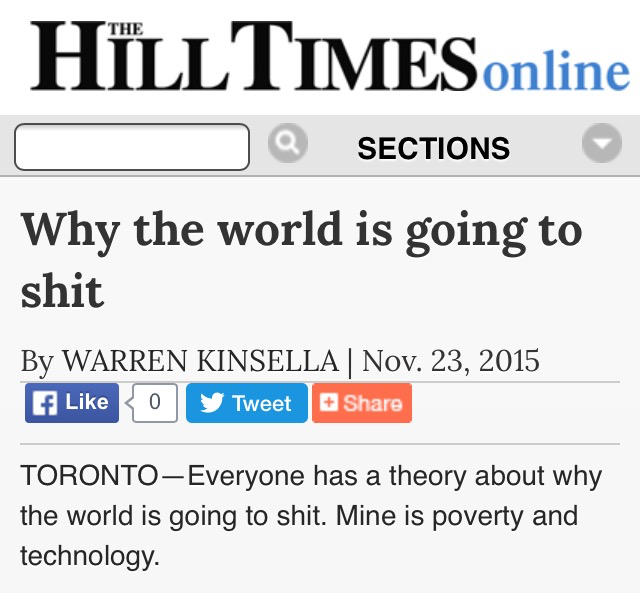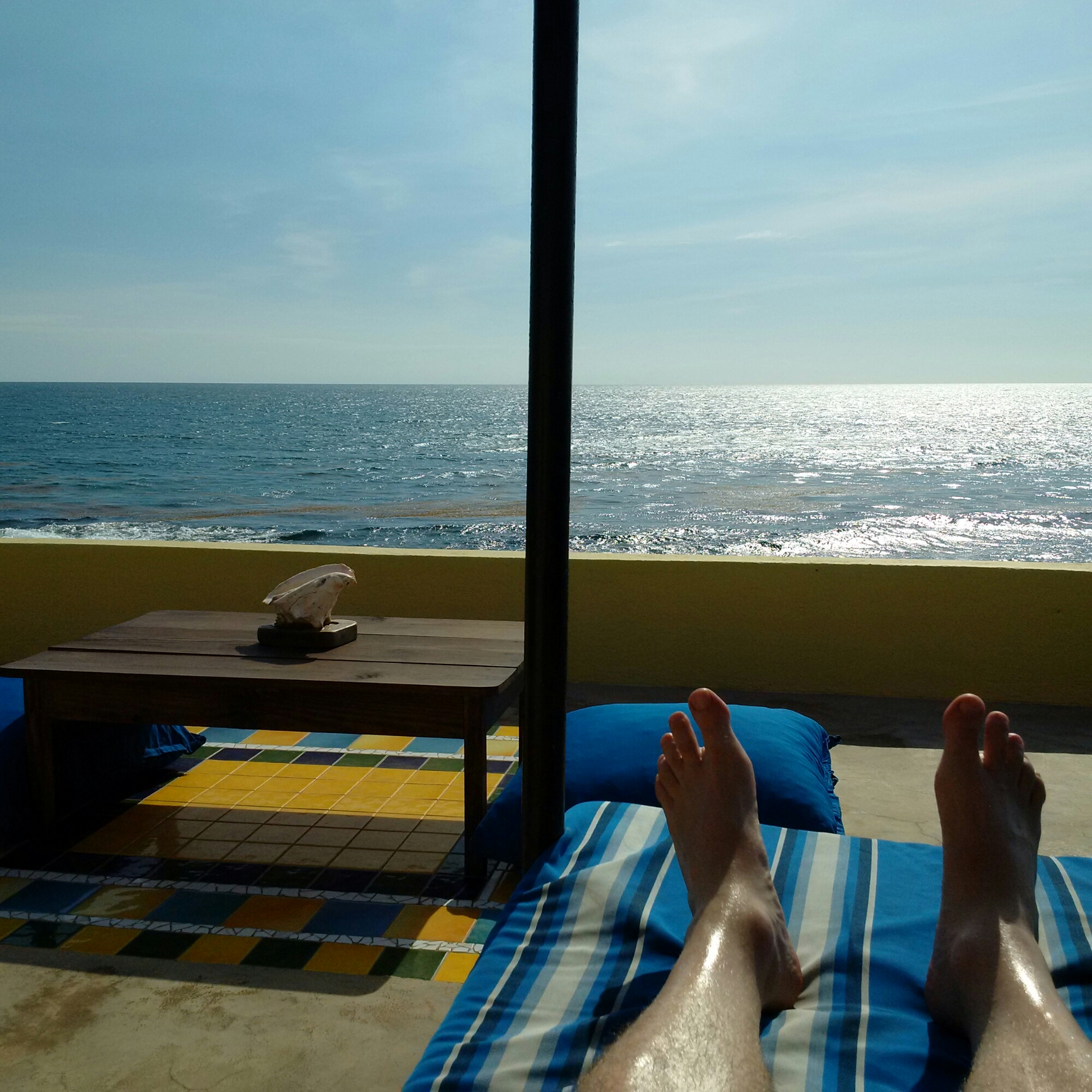In this week’s Hill Times: the religion of the poor
Everyone has their own theory, these days, about why the world is going to shit. Mine is poverty, plus technology.
So, flying el Al into Israel for the first time, two miles up, I could literally see where Israel started, and where it ended. Israel, from the air, is green and lush. It is an oasis. All the countries arrayed around it mostly aren’t: they are a vastness of parched and barren dirt. They are landfill disguised as countries. Looking down at it all, I said to my traveling companion: “Well, that explains a thing or two.”
Same with Dallas, years before, where I lived when I was a kid. I remember it, because I was scared. We weren’t rich, not by a long shot, but when my Dad got lost one day with me and my Mom and brothers in our shiny new American Motors station wagon – and there we were, at a red light in South Dallas, below the Trinity River – I could feel several pairs of eyes on us.
One moment, everything was orderly and familiar; the next moment, it wasn’t. We were stopped in a poor neighbourhood, and it felt like everyone was staring at us, the kids included. Some of them were around my age, eight or nine. “Hey, Daddy,” I apparently said. “That boy looks really mad.”
Bear with me, here, but those kinds of memories – and a dozen of others like them, in different times and places – always leads me back to the same place. Which, somewhat improbably, is Ottawa in the sunny and warm Fall of 31 years ago, when Pope John Paul II came to visit. It was a big deal, his Canadian tour, and he was a rock star, the first celebrity Pope.
I was and am a Catholic, but not ever preoccupied by what popes and priests have to say. I am drawn to the ritual in my religion, the ineffable infinitude of it. The word itself – catholic – means universal. I am attracted to Catholicism because its rituals are more or less the same wherever you go on the planet. And, as such, it ministers equally to the rich and the poor. Or so the theory goes.
Anyway: Pope John Paul came to the world’s attention when he angrily sided with poor trade unionists in Gdansk’s port in 1980. He did so again in September 1984, at the end of his twelve-day Canadian jaunt, when he angrily sided with the world’s poor. After genially receiving all the Premiers and Ministers and the Prime Minister – after cheerfully blessing everyone and saying lots of Masses – Pope John Paul got mad, and he reminded me about that wrong turn in Dallas, or the view of Israel, as seen from above.
The poor of the world grow angry, he said. The anger is about the “excesses” of our lives in the First World, that are too often “irresponsible and barren.” The world’s poor are denied most of what those of us in North America and Europe take for granted – but, increasingly, technology is making them intimately aware of what we have, and what they do not. And no one should be surprised when they rise up, therefore, and they strike out at us.
Said John Paul II to the crowds in Ottawa in September 1984: “A society where profit-making efficiency has become an idol! Your choices amaze and irritate the world – but they never leave it indifferent!”
He was angry, a surprised media reported at the time, thirty years before his prophecy – in its most benign form (the Occupy movement), and its most murderous form (ISIS) – came true. Our excesses, he warned us, were stirring up a tsunami of anger and hate, and leaving no one indifferent. And the ubiquity of technology in the world’s poorest places was making it possible. Inevitable, even.
Even now – more than three decades later – I will sometimes look at a photograph in a newspaper, or some footage in a news item. And there it will be – a Samsung TV in a corner of a dilapidated shack, or a smart phone clutched in a dirty hand in a slum somewhere – all testifying to the Pope’s prescience. Technology has spread more quickly than prosperity.
Anyone involved in daily politics, as I once was, knows immediately what this means: resentment, then anger, then hate. Every campaign seeking to replace a powerful incumbent trades in resentments. It works.
It is not by coincidence, to me, that ISIS has embraced YouTube and Twitter to broadcast its beheadings and mass-murders: the Islamic State is simply making efficient use of the same technologies through which it was alerted to our excesses in the first place. The Internet let them know about how we live: to them, we are too secular, too immoral, and too suffused with greed and self-indulgence.
They saw that, via a flickering blue screen somewhere in Pakistan, and they are hitting “reply all” to express what they think about it. And what they intend to do about it, too: convert us, or murder us for our excesses.
From afar, I have long admired Islam. It has no priests, no papal tours, no palatial cathedrals. It has only its book, and its core meaning – Islam, meaning submission – and its people, who will shortly number more than any other on the planet.
Muslims have faith, and we increasingly do not. Muslims have certainty, while we endlessly cast about for meaning. Muslims have identity, and none of us in the West have had that for quite some time.
Most of all – harkening back to the words of that Catholic pope, in Ottawa, Ontario, of all places – Islam has become the religion of the poor. And, now that they have taken in a few episodes of Lifestyles of the Rich and Famous – or a reality show like Intervention or Hoarders – they are pissed, and understandably so.
Lots of essays get written about what ISIS is and what it isn’t. To me, the Islamic State’s name says it all: they want a state of their own, one where Islam occupies the spot presently held by Dollarama and the Kardashians in our own.
Their preferred weapons are not necessarily the Kalishnikovs they carried through Paris streets, or the explosives they used to blow a jetliner of Russian tourists out of the sky. Those are symptoms, not the cause.
Their weapon of choice, instead, is a smartphone. A smartphone provides snapshots of the way in which we live, and how we are. If you are in the anger business, it is the best recruitment tool in the history of the world.
With that rage about our excesses – and with Islam, the religion of the poor – they intend to conquer the world.
And their war is underway, whether you care to admit it or not.




